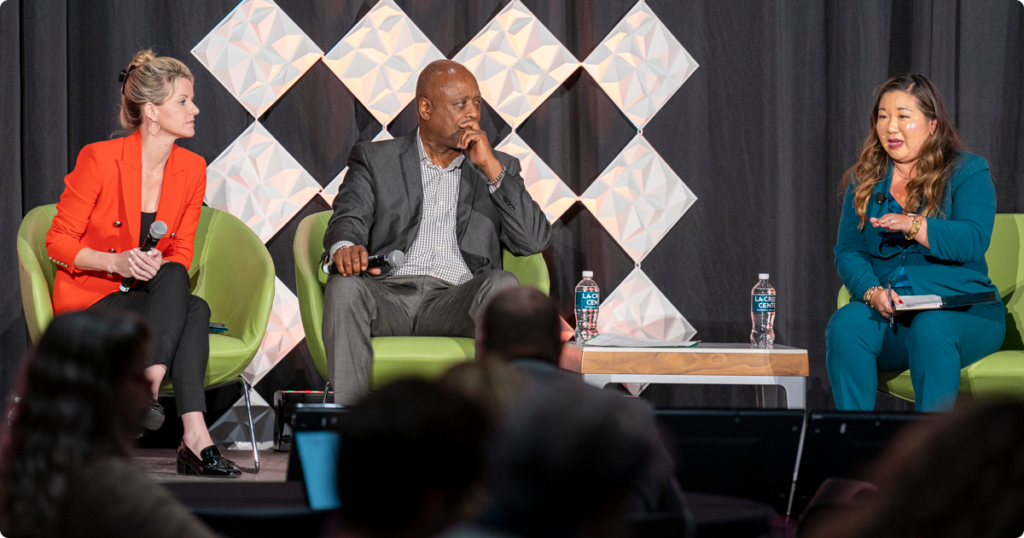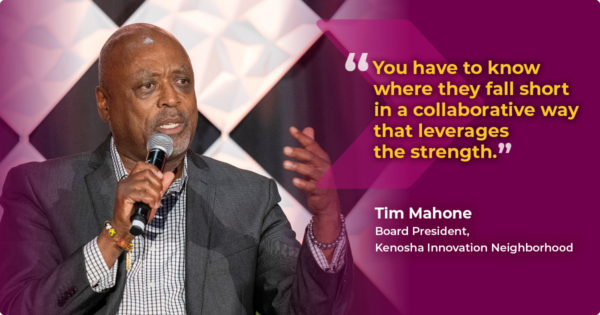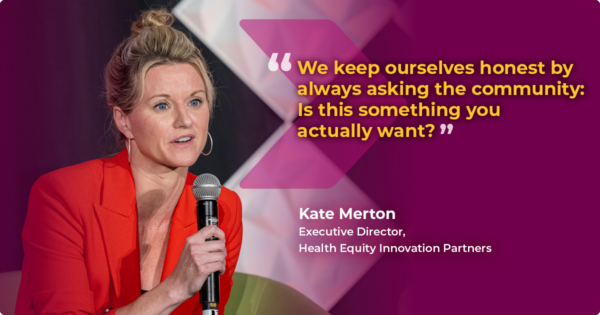
A fireside chat at the Wisconsin Economic Summit 2024 featured (from L to R) Katherine Merton, Tim Mahone, and moderator Shayna Hetzel, the vice president of entrepreneurship and innovation at WEDC.
Working to achieve community engagement is at the heart of inclusive, sustainable growth in Kenosha and the Chippewa Valley, according to those working for innovative change those communities.
“We’re a resilient community. But they were resilient because they were involved in the solution,” said Tim Mahone, chair of the Kenosha Innovation Neighborhood, a project to creatively redevelop 107 acres of vacant land ravaged by civil unrest in 2020.
And Katherine Merton, of the Chicago group Health Equity Innovation Partners, sees the same need to energize the community as she works with the Rural Health Innovation Alliance in the Chippewa Valley to help deliver accessible health care to residents in rural areas.
The two shared insights about tackling seemingly intractable problems at the Wisconsin Economic Summit 2024, hosted by WEDC at the La Crosse Center on Oct. 15-16.
 Mahone said achieving change sometimes requires calling people out and stressing the nature of the problem: “You have to know where they fall short in a collaborative way that leverages the strength.”
Mahone said achieving change sometimes requires calling people out and stressing the nature of the problem: “You have to know where they fall short in a collaborative way that leverages the strength.”
The Kenosha Innovation Neighborhood plan includes a new children’s library, a grocery store and retail development, housing, restaurants, the Kenosha Emerging Leaders Academy, the LakeView Technology Academy, and a business incubator.
The Rural Health Innovation Alliance was announced shortly after hospitals in Chippewa Falls and Eau Claire closed their doors earlier this year. The alliance aspires to make the Chippewa Valley region the epicenter for testing innovative care models and global technology solutions for rural health care delivery. It was made possible partly through a Workforce Innovation Grant through WEDC.
“They’ve had the wake-up call for regional hospitals closing and people losing access to care and having to drive over 100 miles to get that care,” Merton said. “It kind of spurs you to do something with those voices.”
 Both speakers advocated for a future of sustainable, inclusive growth driven by continuous community engagement and strategic investments.
Both speakers advocated for a future of sustainable, inclusive growth driven by continuous community engagement and strategic investments.
The long-term health care initiative involves the University of Wisconsin-Eau Claire and Health Equity Innovation Partners building collaborations with regional health care providers including the Mayo Clinic, entrepreneurs, and others to improve health care access and outcomes while reducing costs. One of its plans is to establish micro-clinics where patients can access in-person and virtual care.
Merton said the alliance has university research and health care expertise but relies on community input to drive the effort. “We keep ourselves honest by always asking the community: Is this something you actually want?” said Merton.
Mahone underscored the importance of community awareness and involvement. “The biggest thing in the toolbox are the people you’re trying to serve,” he said. “You take the tools, work with the tools, you make an investment, you upskill, you retrain,” he said. “We are investing in people to close a skills gap.”
Of the Kenosha initiatives, Mahone added: “It’s a hybrid opportunity of over $100 million of investments. And, without that investment, there’s no access. Without that access, there’s no opportunity.”
